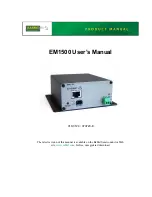
8
7
6
5
4
3
2
1
8
7
6
5
4
3
2
1
S
W
1
S
W
2
Input type
Out B
Full scale
Zero
OFF
ON
- Input type
Pt100
- Option
3 wires
- Out A
4-20 mA
- Out B
0-10 V
- Full scale
200 °C
- Zero
-50 °C
EX. of configuration
SW1 =
SW2 =
SW3 =
4
3
2
1
S
W
3
Out A
Opt
CONFIGURATION BY PC
By software DATESOFT it is possible to:
- set the default programming of the device;
- program the options not available with the dip-switch;
(burn-out level, CJC offset, trip alarm settings, fast sampling, etc...);
- read, in real time, the input and output measures;
- follow the dip-switches configuration wizard.
To configure the device follow the next steps:
1) Power-on the device.
2) Open the protection plastic label on the front of the device.
3) Connect the interface PRODAT to the PC (COM port)
and to the device (PGRM connector).
4) Open DATESOFT.
5) Select the COM port in use.
6) Click on “Open COM”.
7) Click on the icon “Program”.
8) Set the programming data.
9) Click on the icon “Write” to send the programming data to the device.
Warning: during these operations the device must always be powered and the TX/RX cable always connected.
For information about DATESOFT refer to the software's user guide.
J
1
TX/RX CABLE
PRODAT
COM PORT
P.C.
V+ V-
U
V
PGRM
Plastic label protection
DAT
POWER SUPPLY
UNIT
PROGRAMMING
CONFIGURATION BY DIP-SWITCHES
1) Open the suitable door on the side of the device.
2) Set the input type by the dip-switch SW1 [1..5] (see TAB.1)
3) Set the output A type by the dip-switch SW1 [7..8] and SW2 [1..2] (see TAB.2)
4) Set, if available, the input option by the dip-switch SW1 [6] (see TAB.3)
5) Set the minimum input scale value (Zero) by the dip-switch SW3 [1..4] (see TAB.4)*
6) Set the maximum input value (Full scale) by the dip-switch SW2 [3..8] (see TAB.4)*
NOTE:
- It is also possible to set the dip-switches using the wizard of the
configuration software following the procedure described in the section
”Configuration by PC” until the step 6 and clicking on icon “Switch”.
THRESHOLD OPERATION
For the high alarm the relay goes on when the input signal is higher than
the trip level and after the delay time. The relay goes off only when the
input signal is lower than the trip level minus the hysteresis value or when
reaches the minimum value of the input scale and after the delay time.
For the low alarm the relay goes on when the input signal is lower than the
trip level and after the delay time. The relay goes off only when the input
signal is higher than the trip level plus the hysteresis value or when
reaches the maximum value of the input scale and after the delay time.
T(delay)
T(delay)
Active relay
Trip level
Trip level - hyst.
T(delay)
T(delay)
Active relay
Trip level
Trip level + hyst.
HIGH ALARM THRESHOLD
LOW ALARM THRESHOLD
























